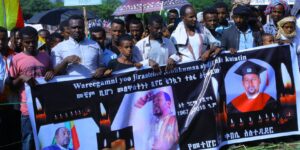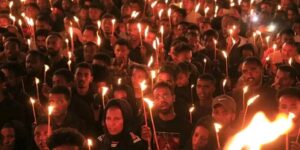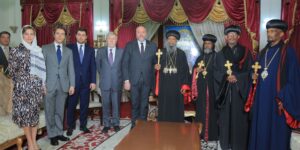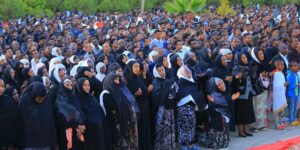There’s a systematic genocide against the Amhara people that is taking place in Ethiopia today. The Amhara genocide has many players involved, with the objective of reducing the Amhara population. Its very evident, the Amhara people especially those living in western Oromia are being attacked and massacred in a horrific way on a daily basis. The massacre of 370 innocent Amhara civilians on 25th June 2022, is evident that a genocide and ethnic cleansing against the Amhara people is taking place unabated.
We send our condolences to the families and friends of the Amhara genocide victims. Our hearts go out to you during this time of sorrow. The chronic collective massacres of the Amhara people is very sickening and those responsible should be held accountable. The brutality and cold murder of innocent Ethiopians because they happen to be Amhara is something we should all stand together and call an end to it. ![]()
The killing frenzy targeting the most vulnerable members of the community is becoming the norm in Ethiopia. Something fundamental needs to be done to bring an end to the bloodbath.
![]() The massacre occurred in the Gimbi district of western Wollega zone in the western part of Oromia. One resident gave a figure of 360 dead, the other said 420. The residents declined to give their names because of fears for their safety.
The massacre occurred in the Gimbi district of western Wollega zone in the western part of Oromia. One resident gave a figure of 360 dead, the other said 420. The residents declined to give their names because of fears for their safety.
“So far we have buried 370 people, which I took part in collecting the bodies and burying them. We just buried them in a farm. We buried 50 to 60 bodies in single graves,” said one resident.
He said he had survived by hiding in a ditch, but had lost four siblings and three cousins in the attack.
The other resident said the attackers were ethnic Oromos from a group called the Oromo Liberation Army (OLA).
“It was a massacre of Amharas,” he said, adding that he had survived by hiding in a forest and he heard the attackers speaking in the Oromo language.
The local Amhara community are desperately seeking to be relocated before another round of mass killings happen, adding that ethnic Amharas who settled in the area about 30 years ago in resettlement programmes were being “killed like chickens”.
![]() The Massacre was carried out by the regime’s military and local militia as they retreated from their camp in Gimbi following an offensive by the Oromo Liberation Army (OLA).
The Massacre was carried out by the regime’s military and local militia as they retreated from their camp in Gimbi following an offensive by the Oromo Liberation Army (OLA).
They escaped to an area called Tole, where they attacked the local population and destroyed their property as retaliation for their perceived support for the OLA.
Ethiopia is experiencing widespread ethnic tensions in several regions, most of them over historical grievances and political tensions. The Amhara people, the second-largest ethnic group among Ethiopia’s more than 110 million population, have been targeted frequently in regions like Oromia.
The Ethiopian government has failed to protect its citizens and is now conspiring with militias to murder innocent people. How can Ethiopians stand tall and proud, when their fellow compatriots are being exterminated from the face of the earth??
That’s why the security operatives can go door-to-door arresting students, political leaders [including the woreda’s branch head of the opposition party, the National Movement of Amhara] and individuals whom they believe are involved in coordinating demonstrations calling for an end to Amhara genocide. When students match and call for their release, they’re instead sprayed with bullets and killed in cold blood by the government that’s supposed to protect them.
![]()
Let us not cherry pick genocides, but condemn and call an end to all genocides in Ethiopia. The Amhara genocide is being taken lightly because there’s an institutionalised Xenophobic tendency towards the Amhara people. However, we should not let that deter us from calling an end to the Amhara genocide or else, the Amhara people will perish.
Ethiopia Autonomous Media
- Lideta Sub City Woreda celebrated International Women’s Day - 11th March 2024
- THE AMHARA FANO FREEDOM FIGHTERS - 13th February 2024
- GREAT VICTORY FROM SHOWA GOVERNORATE - 12th February 2024






